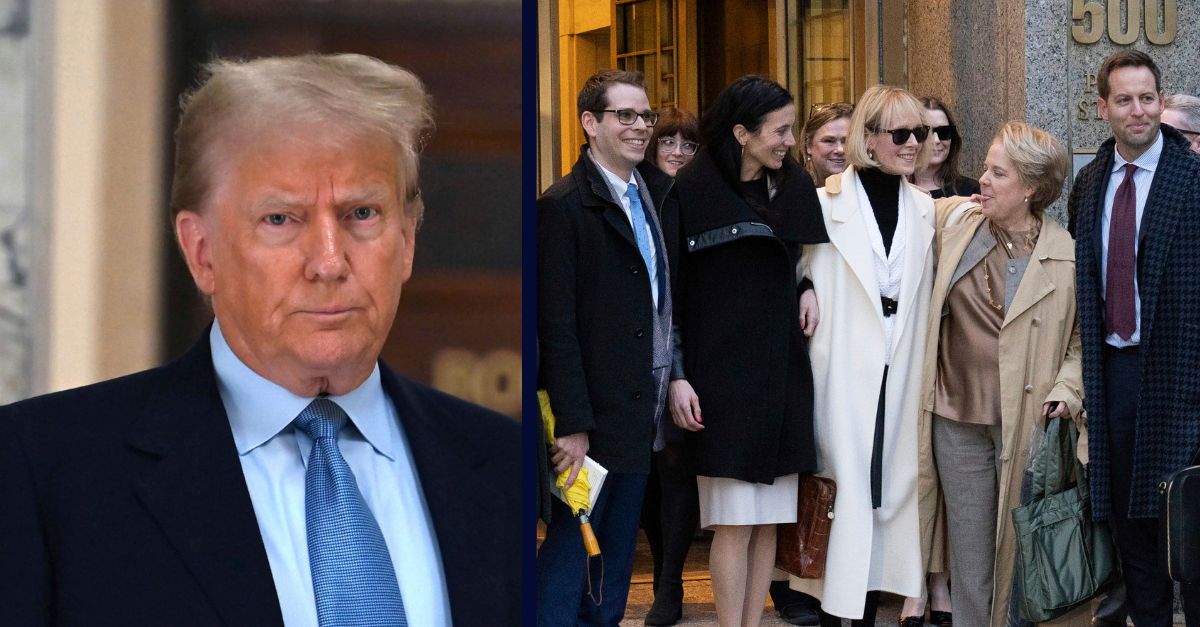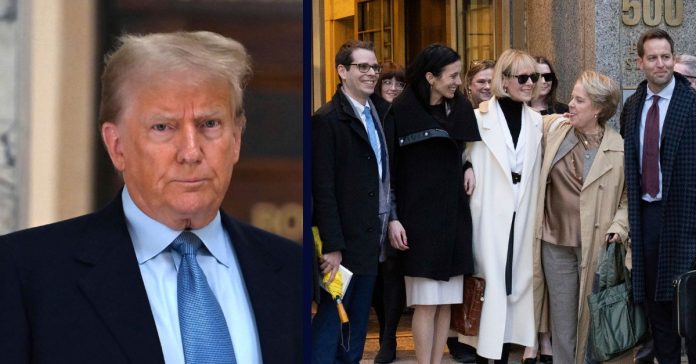
Left: Former President Donald Trump is seen on October 18, 2023 outside the New York State Supreme Courthouse during his civil fraud case in New York City. (NYC) (File Photo by: zz/Andrea Renault/STAR MAX/IPx 2023 10/18/23). Right: E. Jean Carroll leaving the United States District Courthouse poses for a group photo with her legal team after a jury awarded her $83.3 Million in damages incurred through defamation by Donald Trump. (Photo by Derek French / SOPA Images/Sipa USA)(Sipa via AP Images)
Donald Trump‘s “great difficulty” in refraining from making defamatory statements about writer E. Jean Carroll and from casting doubt on whether he sexually assaulted her is so “particularly acute,” according to the writer’s lawyers, that the court must reject the former president’s request for a new defamation trial and cast aside his assertions on appeal that the jury received erroneous instruction.
This request came in a thorough 44-page motion eviscerating Trump’s attempts to totally rejigger his trial defeat in January.
Trump defamed the writer in 2019 when he was still president. He made two statements within a day denying that he had sexually assaulted and threatened her and accused her of fabricating her claims so she could sell her books. At the first trial, it was decided that Trump’s defamatory statements damaged her, and the question remained of how much those damages might cost. At the second trial, it was determined that he made the statements with common law malice and an award was set after brief deliberations.
The $83.3 million defamation award ordered was “entirely in support of her case,” and the jury had flatly rejected Trump’s assertions too about being engaged in some kind of “political conspiracy,” Carroll’s attorney Roberta Kaplan wrote.
“As the Carroll II jury found, those were all lies,” the motion states simply.
With his bond on the order plus interest totaling $91.63 million recently approved, Trump wants a new trial too and seeks to overturn the verdict as he also takes his shot at drastically reducing the judgment. That appeal is before the U.S. Court of Appeals for the Second Circuit and as Law&Crime previously reported, Trump’s legal team says a new trial is warranted because he was “completely muzzled” by the judge and that jury instructions were riddled with error.
U.S. District Judge Lewis Kaplan had ordered Trump not to speak about Carroll’s past relationships, sexual experiences or her orientation; he could not debate or opine about whether he did not sexually abuse or rape her. The legal finding in New York as many people commonly understood the word rape, Judge Kaplan ruled, premised that decision. Trump was also forbidden from arguing that he did not act with malice when making comments about her.
These prohibitions hinged on the fact that he had already been found liable for defamation. His attorneys argued in their motion earlier this month that jurors were falsely instructed after he responded “no” to his attorney Alina Habba asking him when he was on the stand if he did not instruct anyone to hurt Carroll with his statements and then, added further, that he wanted to “defend myself, my family and frankly the presidency.”
This prompted a sustained objection and instructions from Kaplan to the jury to disregard what Trump had said beyond the word “no.”
In his bid for an appeal, Trump argued this was a mistake because “for common law malice, the inquiry is focused on the ‘defendant’s mental state in relation to the plaintiff”” and the court refused to hear his testimony about his mental state, he said. By “erroneously foreclosing” on his testimony, it made it all but a certainty that the jury would reach a “baseless punitive damages award” in Carroll’s favor.
But in Carroll’s opposition, her lawyer says the court offered clear instruction that jurors could award punitive damages if they found Trump made defamatory statements about the writer with a deliberate intent to injure her or if it was done “out of hatred, ill will or spite, or in willful, wanton, or reckless disregard of another’s rights.”
This was an exact match to the New York Pattern Jury Instructions existing under state law and it is otherwise consistent with dozens of other similar cases, yet Trump insists punitive damages could only be awarded if it was found that he acted “solely with this intent or motivation,” Kaplan wrote.
“He is mistaken,” she added. “All but one of the cases Trump relies on arose in the context of using common law malice to overcome a privilege defense, not to award punitive damages.”
Carroll’s burden was to prove he maliciously defamed her by a “preponderance of evidence” and where Trump says the court got that wrong and that only a “clear and convincing” standard is necessary, that simply isn’t so, Kaplan wrote.
Trump testified in January for less than three minutes, rolling his eyes at times and, according The Associated Press, never bothering to look at the jury as he answered tailored yes or no questions due to the existing liability restrictions on his testimony.
That was, anyway, except for when he remarked about her: “She said something that I considered to be a false accusation” and then he continued on, saying he was attempting to “defend” himself and the presidency. Trump also said he “100%” stood behind his statements in a 2022 recorded deposition the jury heard at trial where the former president called Carroll a “whack job” and “sick.”
Carroll’s lawyers wrote Tuesday that after he was done on the stand, “the jury heard with their own ears and saw with their own eyes exactly how Trump has continued to defame Carroll since the Carroll II verdict and his mid-trial promise to defame her ‘a thousand times.’”
“And the jury watched Trump carry out this promise in real time treating the courtroom like a campaign event,” attorney Kaplan wrote.
His history at the second trial of refusing to exclude evidence that was no longer permissible in light of his defamation liability was part and parcel of the disruptions one could come to expect, she added. Though he did not attend the first trial, he “paired his attendance with disruptive conduct” at the next one, to be sure.
His mutterings within earshot of the jury despite orders not to communicate or attempt to communicate with them, his shaking of his head “in disgust” when the court would describe how he assaulted Carroll in a dressing room in the 1990s.
“Trump made a loud ‘yech’ sound. Then, when the court asked the prospective jurors to raise their hand if they thought ‘Trump is being treated unfairly by the court system,’ Trump raised his,” the motion notes.
“Given this pattern of behavior, Carroll understandably had serious concerns that Trump would continue in his attempts to cast into doubt whether he sexually assaulted and defamed Carroll, and would do so in front of the jury. That danger seemed particularly acute if Trump himself elected to testify — since the Carroll II verdict, Trump had repeated his defamatory statements about Carroll in multiple forums and included references to topics that this Court had ruled inadmissible in the upcoming trial. And during this intervening period, Trump had also testified in a different lawsuit, where he repeatedly defied the judge’s orders in that case,” Roberta Kaplan added.
Though Trump claims he was muzzled, the motion highlights the trial transcript extensively, noting that there were multiple circumstances where the former president consented to the limiting of questions or when objections would be sustained because he responded to yes and no queries with an open-ended response.
Because Trump solicited and agreed to limits on his testimony in court, he also waived his review of this argument on appeal. Even if he hadn’t, Roberta Kaplan, added, his claims were “meritless” and his attempts to erase the millions he owes Carroll for emotional and reputational damages were less than thin.
Expert testimony at trial convinced jurors that when Trump’s comments about her in June 2019 got out, they reached between 21 million to 25 million people. Carroll went from making $50,000 a year as a freelancer, Kaplan noted, to making $500 in 2023.
In a separate motion filed by Carroll’s team on Tuesday, the lawyers also asked the judge to once more reject Trump’s attempt earlier this month to throw out the case by claiming Carroll didn’t prove Trump was the cause of her injuries. The judge heard this argument from the bench and rejected it in January.
Now that he’s trying it again, his argument has only “grown weaker, not stronger,” Kaplan wrote.
The jury was instructed to reach a verdict using Trump’s own language, they heard his claims in closing and nevertheless, rejected him, the attorney wrote, and the court should do the same.
Have a tip we should know? [email protected]

